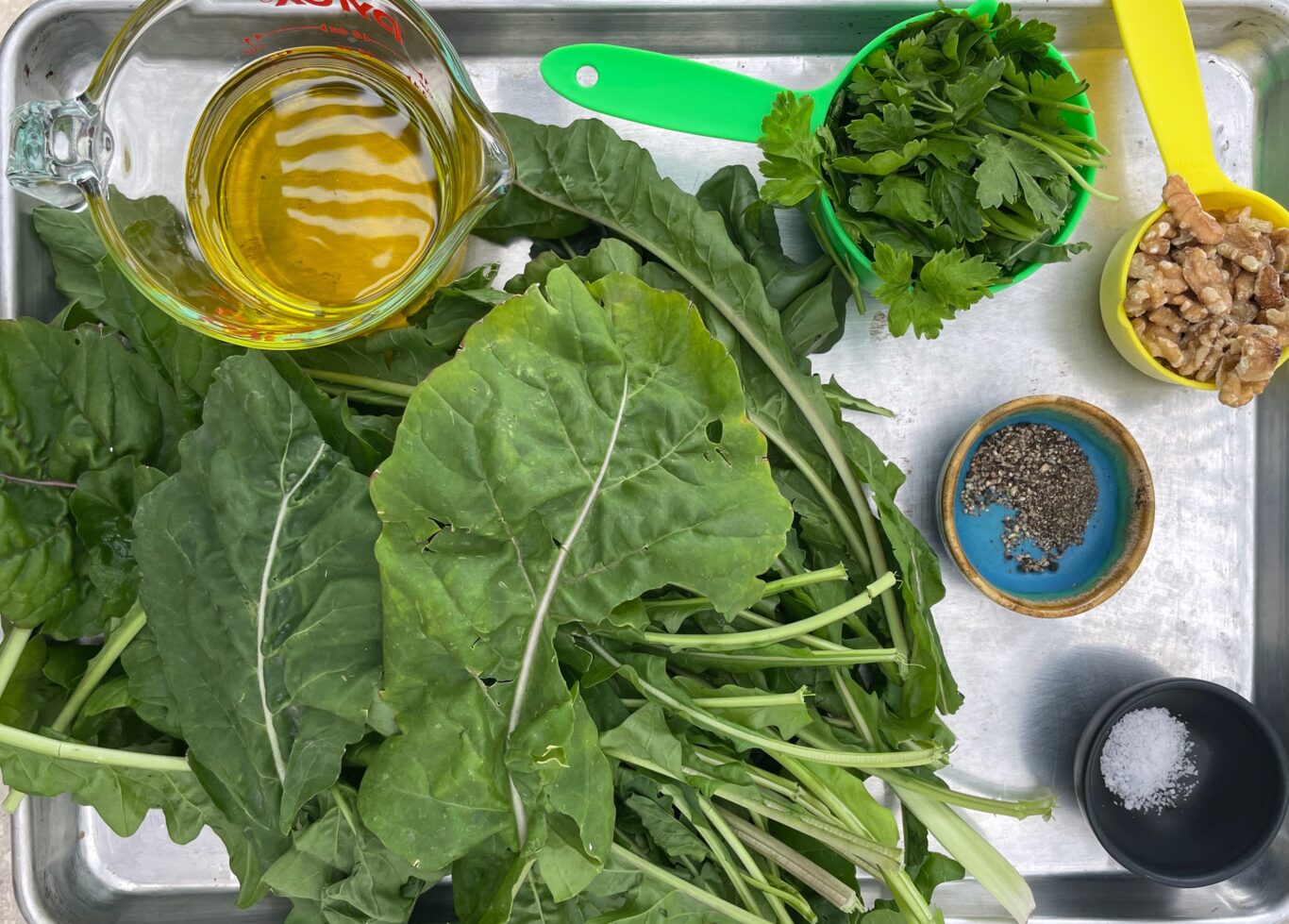
Choline and Betaine: 2 vital ignored nutrients
The ingredients here are staple ingredients that should typically be in your pantry. You can easily substitute other root vegetables for the beet, but you will not have the burger like texture that the raw beet lends when slightly cooked. This burger has a good mild flavor and sticks together very well. Make sure your lentils are not overcooked but are still in their husk. This is assisted by sprouting the lentils. This makes a more firm lentil. It also increases the protein and vitamin content. Plan ahead of time to make these burgers because you need a full 3 days plus several hours to soak, sprout, cook, then drain the lentils.
This is also a good recipe to use up extra already made grain. You can substitute any grain you have on hand. If you decide to use high selenium amaranth to help with your detoxification, you may need to use a few tablespoons of tapioca flour to help the ingredients stick. In general if you have a dough that seems too sticky, and you need a binder, tapioca flour or garbanzo flour are good options and can bring a burger or patty dough together nicely.
Eating Choline (lentils) or Betaine (beets) increases Neurotransmitter synthesis of Acetylcholine
This will help with anxiety, depression, digestion, and mental function such as intelligence or ability to play a sport.

1 cup dry lentils
1 1/4 c white cooked long grain rice or quinoa
1 cup grated beet
1/2 c finely grated carrot (use a micro plane zestier)
1/2 c scallions or white onion ( I used mostly white parts of extra large scallions)
2 garlic cloves
1 T chia seeds
1 T mole dissolved in about 1 T water (works better over a little heat and the flat side of a spoon) (option, you can also omit or try 1 1/2 t tomato paste)
1 t rough sea salt
1 t dried oregano (recently dried)
1 scant cup finely chopped walnuts
Steps: (Steps 1-4 must be started 3 days ahead of time, but each step only takes 1 minute)
- Soaked the lentils for 48 hours in filtered water. If you live in a warm climate you can reduce this time to 24 hours or drain and rinse after the first 24 hours to prevent spoilage.
- Sprout lentils 24 hours by draining the lentils and placing a towel over them on the counter. They just need to sit. By the end they should have a small tail sticking out.
- Cook lentils 2-3 hours. At this point you can let them sit overnight in the water until you are ready to use them.
- Pour liquid off lentils and let drain for 2 hrs in a strainer. Be sure to reserve the liquid for vegetable stock. It can be frozen, or stored 5 days in the fridge.
- Sauté garlic and onions in 3 T olive oil until slightly caramelized. You can use any type of onion you have on hand. Did you know red onion or scallions are more alkaline than sweet white onions?
- Mix all other ingredients
- Make into patties. Be sure to press the edges inward with the cup of your hand.
- Fry in olive oil gently on each side until browned, about 2-4 minutes per a side.

Choline Needs for Babies
Newborns require 18 mg/kg of choline per day, and breastfed infants receive choline through maternal mammary glands . However, levels depend on the mother’s diet. At birth, a baby’s choline concentrations can be three to five times higher than their mother’s due to fetal accumulation {IOM, 2019 #516}.
Choline’s Crucial Roles
Choline serves three main roles as it provides carbons, it is a component of lipids, and is required for acetylcholine synthesis. In these ways it participates in the following functions:
Choline and One-Carbon Metabolism
Choline is a key player in the interconnected network of biochemical reactions known as one-carbon metabolism. This process, involving nutrients like folate, vitamin B12, B6, riboflavin, serine, and choline, is essential for DNA and RNA synthesis and epigenetic programming. Optimal one-carbon metabolism is critical for the correct formation of the fetal nervous system and overall development. Choline, in it’s participation in regeneration of methionine from homocysteine, provides methyl groups essential for gene expression and regulation or in other words, epigenetic programming . This also keeps the homocysteine levels low and provides the body with enough methyl groups so that inflammation and disease stay at bay . Overall choline plays a determining role in the developmental origins of disease, or the theory that adult disease starts from in utero.
Epigenetic Health
Choline is a primary source of methyl groups essential for DNA regulation and gene expression, above the level of the gene (or epigenetics). Choline contributes to the epigenetic health of the infant and can lower the risk of birth defects and disorders such as neural tube defects, Down’s syndrome, and Alzheimer’s disease .
Neurotransmitter Synthesis
Choline is a precursor for acetylcholine, a neurotransmitter essential for nerve function. Acetylcholine is also crucial for various bodily functions, including cardiovascular regulation, muscle control, cognition, and memory {Adams, 2021 #584}.
Choline in Lipid Metabolism and Nerve Function
Choline also plays a role in lipid metabolism, aiding in nerve myelination, bile secretion, hepatic lipid export, and alveolar surfactant formation needed by the lungs to breath correctly . Hepatic lipid export refers to how choline is also important for normal liver function and it is used to transport fat from the liver. Choline is used in the synthesis of the phospholipids that are in very low density lipoproteins (VLDLs) which are a primary mechanism of transporting fats and cholesterol from the liver to the rest of the body after the fats are digested/assimilated by the liver. Remember that the movements of fats in the body are also important for skin structure, so for example, you need to make choline to make phosphytidylcholine which surrounds your each cell membrane.
Cell Division and Membrane Structure
Choline is crucial for cell division and the formation of cell membranes, particularly phosphatidylcholine. The mother has two biosynthetic pathways by which choline can be turned into phosphatidylcholine in the liver. Your baby has billions of cells each of which is surrounded by phosphatidylcholine. Choline also influences placental function.
Fetal Brain Development
Choline plays a pivotal role in fetal brain development and is associated with improved cognition in children {Adams, 2021 #584}. For one example, a study found that mothers with higher choline levels during pregnancy had children with better spatial memory of both auditory and temporal categories as well as improved recall memory .

Deficiency of Choline Production During Pregnancy
While the body can produce choline, maternal production by the liver is insufficient to meet fetal demands . A deficiency in fetal choline may lead to impaired neurogenesis and neural tube defects just like a lack of folate can cause neural tube defects {Adams, 2021 #584}. Inadequate choline levels can also contribute to stillbirth, preterm delivery, and low birth weight. Choline is especially vital for fetal brain development, with higher levels during pregnancy linked to improved processing speeds and cognitive development in children . Lack of choline in pregnancy can increase the risk of Down’s syndrome and Alzheimers disease later in life. It is amazing how the effects of your diet while pregnant affect your babies entire lifespan!
Third Trimester and Nursing Babies Higher Need for Choline
Choline complexed with long chain polyunsaturated fatty acid concentration (such as DHA) progressively increases in the placenta and fetus compared to maternal circulation which implicates a mechanism for the sequestering of choline {IOM, 2019 #516}. A baby steadily accumulates choline in it’s body throughout gestation by taking it from the mother’s stores. So your baby will be born with the choline it needs, but you may experience health deficiencies if you do not consume enough. A nursing baby needs 18 mg/day of choline and the mammary glands can synthesize and secrete choline into the breastmilk. Remember that your body must have the precursor molecules for choline or choline in your diet in order to be able to do this. Nutrition during lactation is as important as that during gestation. After that, nutrition of a child during their first 7 years of life sets them up to succeed or fail.

Choline Supplementation and Food Sources
High-choline foods include beans, eggs, lentils, tofu/soy milk, peas, and seafood. Although choline should be seen as a necessary nutrient, there is low quality of evidence available to recommend supplementation during pregnancy and therefore it is best to focus on regularly eating foods that contain high choline levels.
Betaine Food Sources as a Choline Precursor
Betaine is an organic compound found in various foods, especially beets (from which it gets its name). It can also be obtained from dietary supplements, but this is not recommended during pregnancy or lactation due to the lack of regulation oversight on supplements which means they can be high in (toxic) byproducts. In general it is always better to obtain nutrients from foods, not supplements.
Betaine Homocysteine Methyltransferase (BHMT) Reaction: In this reaction, betaine donates a methyl group (CH3) to homocysteine, a sulfur-containing amino acid. This reaction is catalyzed by an enzyme called betaine-homocysteine methyltransferase (BHMT). The reaction results in the conversion of homocysteine to methionine and dimethylglycine (DMG). Methionine is an essential amino acid used in protein synthesis, and DMG is a precursor to choline.
Conversion of Dimethylglycine (DMG) to Choline: Dimethylglycine (DMG) is further metabolized to produce choline. This involves a series of enzymatic reactions, including the removal of one methyl group to form trimethylglycine (TMG) and subsequent conversion to choline.
Choline Formation: TMG (trimethylglycine) is ultimately converted to choline. The precise steps and enzymes involved may vary, but one key enzyme in this process is dimethylglycine dehydrogenase.
The choline produced through this pathway can be used in various biochemical processes in the body, including the synthesis of phospholipids (important for cell membranes), neurotransmitters (like acetylcholine), and lipoproteins (for lipid transport). As you can see, being out of beets is a good reason to head to the grocery store is being out of beets…just like you would when you are out of eggs or milk.
Eggs contain approximately 300 mg of choline per egg. Eggs also contain good quantities of B12, are the easiest protein to digest, and do not harm any animals if they are truly free to roam or from spoiled chickens. Two eggs a day will provide all your choline needs and about half your B12 needs. If you are vegan, you need to add eggs during pregnancy for the health of your baby because food forms are always optimal for your child’s health. Just because there is a lack of data to show that supplementation can have a downside for a nutrient does not mean that this is not true. Up the B12 of your diet by adding an egg on top of your veggie burger.

Supplementation for Folate Defects and at Risk Babies
Supplementation should be undertaken when you have a risk of a preterm baby or of non-neuronal birth defects like cleft lip or hypoplasia of the jaw, or a defect of folate metabolism. In this case it is essential to stay within the recommended intake limits, with the Tolerable Upper Limit set at 3500 mg/day.
In summary, choline is a vital nutrient during pregnancy and breastfeeding, impacting fetal brain development, lung function, gene regulation, and overall maternal and infant health. Ensuring adequate choline intake through diet and, if necessary, supplementation, is crucial for a healthy pregnancy and infant development. Adequate choline and betaine is needed by all people as these are precursors to acetylcholine, a main neurotransmitter in the body.
References for myyyyy (science) bitches
IOM, et al. (2019). Diet Ref Intakes Sodium Potassium. National Academies of Sciences, Engineering, and Medicine; Health and Medicine Division; Food and Nutrition Board; Committee to Review the Dietary Reference Intakes for Sodium and Potassium, National Academies of Sciences, Engineering, and Medicine; Health and Medicine Division; Food and Nutrition Board; Committee to Review the Dietary Reference Intakes for Sodium and Potassium. 1: 1-10.
Adams, J. B., et al. (2021). “Evidence-based recommendations for an optimal prenatal supplement for women in the US, part two: Minerals.” Nutrients 13(6): 1849.







